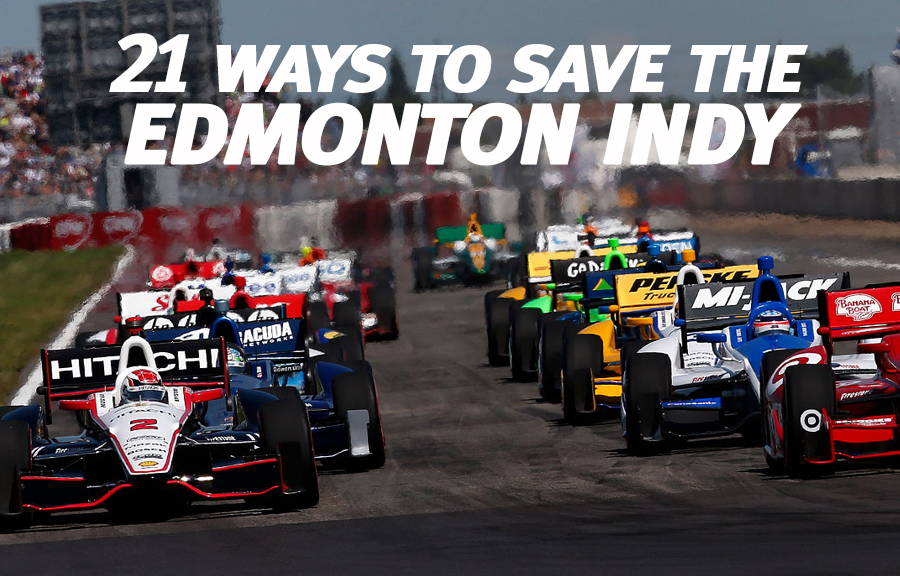The ripple effects of losing an event like Indy will be detrimental to our City.
Vancouver didn't know what they had until they lost it—and the same is going to happen to Edmonton if we're not more cognizant of our weaknesses and threats. The only difference between Vancouver's situation and Edmonton's is Edmonton will NEVER, EVER get the Indy back if we lose it. Vancouver's kung-fu grip will be tight. They'll never let it go a 2nd time. That being said, if (and that's a big 'if') Edmonton gets one last chance at making Indy successful in 2011, the following is a list of 21 things that must be done in order to have any hope of a shot at Expo2017.
1. Create a shared vision, purpose and strategy.
Instead of a bunch of disjointed, competing events, create one major event, with a central theme running through all supporting events. This gives Capital Ex (under a new name), Taste of Edmonton, The Edmonton Indy, as well as shops, restaurants, pubs and bars a shared purpose and an aligned strategy. More importantly it gives the customers something to rally behind.
2. Establish ownership by all stakeholders.
Accountability. Imagine that. Wouldn't it be awesome to see all of the companies involved in running the event put their profits on the line? If it's a success, you reap the rewards. If it's a flop, sorry pal—no pay cheque. (This only works if everyone is on board and there isn't any dead weight).
3. Articulate “innovation" as an organization/event-wide commitment.
Without innovation and a sense of “nowness" you'll have bored, uninspired staff. This trickles down to bored, uninspired customers.
4. Think long-term.
What do we want this event to be 3, 5, 10 years from now? The short-term, year-to-year, go-with-the-flow, take-it-as-it-comes attitude is so 'Edmonton.' Let's get our shit together. Seriously.
5. Focus on the customer experience—the brand—rather than the internal processes.
Otherwise you are just going through the motions.
6. Focus on challenges of the future rather than successes of the past.
Unless you're in the business of selling Transformers or the Rubik's Cube, you cannot build a profitable business on nostalgia.
7. Evolve or die.
Be willing to change when your platform is burning. Even more important…be self aware. Know that your platform IS burning!
8. Leave politics out of it (if-and-whenever possible).
Politics can open a lot of doors, but in many cases it leads to sustaining the status quo in order to support entrenched, misguided and conflicted interests. See #7.
9. Reward crisis prevention rather than crisis management.
10. Get rid of any hierarchies that exist.
Inspire. Undermanage. Constantly review new ideas.
11. Fund new ideas in the wake of kiboshing current under-performing efforts.
12. Retire unsuccessful initiatives, especially ones that are funded and staffed.
13. Think critically.
Fear of criticizing current practices and commitments is a high-risk activity.
14. Make decisions with your gut. It's usually right.
Addiction to left-brained, analytical thinking (“data is God") is corporate crack. People are emotional and heart-driven beings. Data is not as much of an advantage as it used to be.
15. Ideate-collaborate-deviate.
Adopt a more user-friendly idea management processes.
16. Find people that understand (and more importantly care to understand) the customers.
17. Be willing to acknowledge and learn from past failures.
Why is this one so difficult? It shouldn't be. Own up to your mistakes and move on.
18. Make innovation part of the performance review process.
This goes for every single company/stakeholder/employee/volunteer involved. “How much did we/I innovate this year?," “Did we/I raise the bar?" If you're not moving forward, you're moving backward.
19. Create room for more “spec time" to develop new ideas and opportunities.
Good ideas take time. The best ideas take longer.
20. Coach innovation and creative thinking.
I'm serious. Just as execs would bring in coaches/trainers into the office for their staff, Indy should do it too. This is after all a business (or at least it should be).
21. Create reward and recognition programs for every portfolio.
People like to know that their hard work means something.


